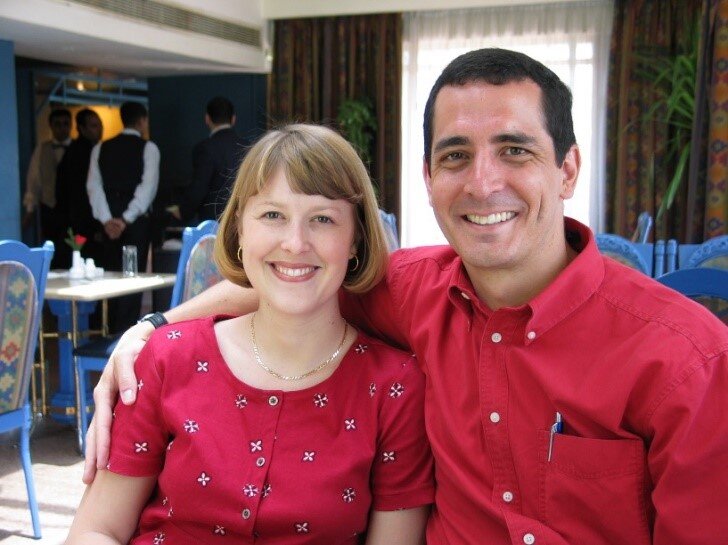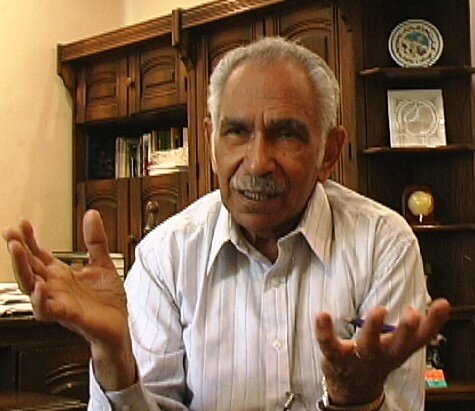Finding Friends and Mission Partners
INSTALLMENT 3 OF THE HISTORY OF THE OUTREACH FOUNDATION IN EGYPT
by Jeff Ritchie
The trip to Egypt in early 1999 established the priority goal for the mission of The Outreach Foundation in Egypt: building the capacity for the Evangelical Presbyterian Church of Egypt to engage in mission and evangelism. Out of that trip emerged our first two projects: the training of a professor to teach mission and evangelism at the Evangelical Theological Seminary in Cairo and support for a new church development in the 10th of Ramadan City, one of forty-four new cities being developed by the Egyptian government to alleviate the population crush of Cairo.
In this chapter, we will trace the initial steps to follow up on the commitment to the teaching of mission and evangelism at the Cairo Seminary. The next chapter will introduce the 10th of Ramadan project.
First Presbyterian Church of Houston
We had received one generous gift for the training of the future professor of mission and evangelism, but we needed much more to sustain this person for three or more years. The First Presbyterian Church of Houston had a long history with The Outreach Foundation, and it was there I focused my efforts.[1] The church’s pastor, the Rev. Dr. Vic Pentz, had recently served on our Board of Trustees. The Director of Missions, Mrs. Marilyn Borst, had great interest in Egypt, both from her academic study in archaeology and history and from First Presbyterian’s involvement in other parts of the Middle East. Marilyn also knew The Outreach Foundation well from the Network of Mission Pastors and Mission Directors in the Presbyterian Church (USA) of which she and I were both members.
I went to the church in the fall of 1999 to share the seminary’s vision for the training of a professor for mission and evangelism. I proposed that First Houston commit $10,000/year for three years, the minimum time it would take for the future professor for the Cairo Seminary to earn a Ph.D. The staff liked the proposal, and Marilyn Borst became the point-person at First Houston to advocate for the proposal with the church mission committee.
She got tentative approval from the committee to support the project, but the committee did not like the idea of a three-year financial commitment. “Let’s approve $10,000 now,” they said, “and revisit the proposal each year.” Then one of the committee members, quietly asked: “If this person is willing to commit three years to training, why cannot we commit to three years to support it as well?” Her word carried the day.
First Presbyterian Church was to go on to invest almost $75,000 over five years in the training of the Rev. Tharwat Wahib Wahba at the London School of Theology. This investment was just the beginning of a deep relationship between the Houston congregation and the Church in Egypt.
Darren and Elisabeth Kennedy
In the late 1990s, I visited the campus of Princeton Seminary to spend time with one of the student fellowships on campus. Among the students I met was a couple who were Elisabeth and Darren Kennedy. Elisabeth had grown up in Jordan as the child of missionary parents. She was fluent in Arabic. Darren and she had met at Princeton University, were married, and were now studying at Princeton Seminary in preparation for missionary service.
As part of their preparation, they went to Egypt between their first and second years in seminary and served as interns in a congregation of the Egyptian Presbyterian Church. I was delighted to meet them and encourage them in their missionary vocation, for it reminded me of my call to mission service in Korea which took shape during my seminary days twenty years before.
The Kennedys were appointed to serve at the Cairo Seminary in 1999, and The Outreach Foundation raised funds for their support. They, in turn, became advocates for the training of the professor of mission and evangelism and were part of a video we made to showcase the new opportunities for US Presbyterians to engage with the Church in Egypt through our two projects. Darren also helped introduce us to the next person who would be critically important to the teaching of mission and evangelism at the Cairo Seminary, the Rev. Dr. Swailem Hennein.
Swailem Hennein
When Dr. Atef Gendy became President of the Seminary in 2000, he felt completely overwhelmed by the challenges the seminary faced at that time. The new job literally made him sick, and he was hospitalized for stress. Amidst his worry, he remembered the story of Elijah when his life had been threatened by Queen Jezebel: “I alone am left,” Elijah complained to God (1 Kings 19:14). God’s answer to him was, “I have others who are faithful.” Taking hope from this Scripture, Dr. Atef looked around for those whom God would bring to the seminary to help it turn around and move in a positive direction.
One place where Dr. Atef knew he needed help was in laying the foundation for a mission department for the seminary. He had heard of a missionary family sent by the Egyptian Church to Sudan in the 1950s, the Rev. Swailem Hennein and his wife, Mrs. Sameera Rizk. They served in Sudan for ten years and then in Kenya for seven years. Afterward, Rev. Swailem took a Ph.D. in public health and taught in the United States until his retirement.
Dr. Atef had never met Dr. Swailem, but he knew the high regard the Egyptian Church had for Swailem and Sameera’s missionary service in sub-Saharan Africa. He called him to ask for his help in setting up a mission department at the seminary. Dr. Swailem volunteered without hesitation. “Atef, I am with you,” he said. Beginning in the fall of 2000, Dr. Swailem taught mission classes, helped develop the mission curriculum, and worked with Dr. Atef to discern who might be best suited to become the professor of mission and evangelism after him.
The Outreach Foundation began hearing about Dr. Swailem from Darren Kennedy in Egypt and from the Rev. Dan McNerney of Presbyterian Frontier Fellowship, a mission organization with which we have worked closely over the years. Our partner in supporting the Cairo Seminary, First Presbyterian Church of Houston, had a new pastor, and the mission staff thought it good for the new pastor and the mission committee to meet this person who was developing the initial mission vision at the Seminary. Darren Kennedy helped us get Dr. Swailem to the church in January 2002. Dan McNerney and I went to Houston also to hear Dr. Swailem and to recruit members from First Presbyterian on a joint Outreach-Frontier Fellowship trip to Egypt in the spring (the subject of Chapter 4).
Dr. Swailem spoke to us on what he termed “Reconciliation Evangelism,” his concept of mission and evangelism for the Egyptian context. Just as Christ came to reconcile the world to God, Dr. Swailem said, so the church is called to be an agent of reconciliation in the community in which it is located. Dr. Swailem expressed the hope that the Cairo Seminary would train 30-40 “primary reconciliation workers” who would then be sent by the Church to establish mission outposts in areas of need. Working together with others in the community, Christian and Muslim alike, these primary reconciliation workers would provide services which the community had identified as its most important needs.
Where would the “evangelism” part of “reconciliation evangelism” come in, we asked? Dr. Swailem’s reply was careful but hopeful:
Information . . . about church matters will be readily available for those who ask. Wisdom will be applied [to] whom to invite for regular worship and church services. In time, the beginnings of a congregation will evolve [emerge] around Bible Study and prayer activities. Instruction with open-ended dialogues will be given about the over-riding concept of “reconciliation” – goodwill, mutual trust, constructive relations, handling prejudice and fear.
As we listened to Dr. Swailem, we discerned the heart of a deeply spiritual man who had grown up in rural Egypt and knew the challenges of doing mission where Christians usually were a small minority of the population. For Christians to initiate social service programs in the name of Jesus the reconciling Lord would be an audacious act and possibly threaten the social dynamics of the community. Yet this was what Dr. Swailem was proposing for the Church in Egypt. The training would be provided by the Seminary, support would come from outside Egypt, and the mission itself to be done with local partnerships.
This was a new vision for outreach in Egypt that was both biblically based and sensitive to context. The Outreach Foundation and our sister organization, Presbyterian Frontier Fellowship, were ready to “sign on.” So was our first strong U.S. partner, First Presbyterian Houston, which reaffirmed its willingness to support not only the training of the future mission professor but also to send four of its mission people on our spring trip. That trip became the catalyst for many future mission connections with the Evangelical Presbyterian Church of Egypt.
———
[1] Some of this history is related in “The History of The Outreach Foundation in China,” available from The Outreach Foundation, 381 Riverside Dr., Ste. 110, Franklin, TN 37064, or may be requested from the author.


